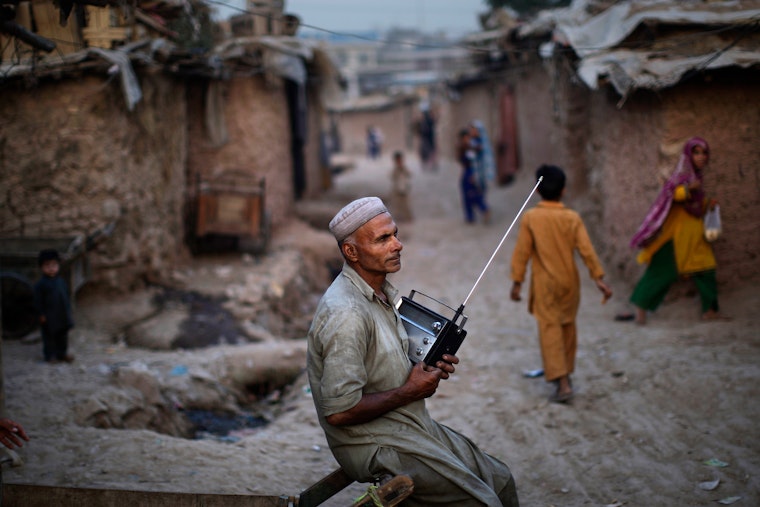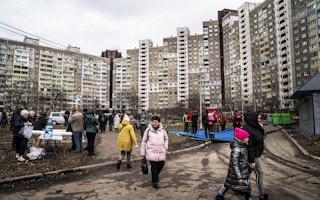Persecution at Home and Abroad: Pakistani Human Rights Defenders on the Run

The same passion and drive for social change that drives rights defenders to speak up for their communities can also pose huge risks for their own safety and livelihoods. As part of our work to promote human rights defenders, we are profiling some of those around the world that are facing ongoing threats, and showcasing innovative solutions we are supporting to respond to defenders’ needs.
Fazl and Nazish are two rights defenders from Pakistan whose efforts to encourage public health campaigns and the education of women brought a wave of persecution. Exiled for the last four years, they were recently assisted by the Shelter City Initiative, an Open Society Foundations grantee based in Nepal, which allows rights defenders to escape an immediate threatening situation and provide some temporary respite.
Fazl
We are both originally from the Pashtun tribal areas of northern Pakistan near the border with Afghanistan, outside of the city of Peshawar. Because of the repressive attitudes held by senior members of our community, we wanted to encourage the education of youth and particularly women, whose access to school is frequently restricted by conservative tribal elders. In 2013, I began work a radio presenter as a way to raise awareness of issues in my community, which are poorly understood in urban areas due to the volatile security situation which contributes to the lack of media coverage. Over the years there have been many armed groups operating in the region, including Tehreek-e-Taliban Pakistan, who claimed responsibility for the shooting of education activist and Nobel Prize laureate Malala Yousafzai.
To engage audiences, we first broadcast music, then discussed important topics like women’s rights, public health, and climate change. When I started to discuss education, things became difficult, and I was forced to move to different radio stations several times either under pressure from extremist elements or from the political allegiances of the radio authorities. But we still endeavored to encourage parents to send their daughters to school, and slowly we developed a fan base without our faces being known, only our voices.
“Whenever you go against a powerful system, you should expect some consequences. We feared threats from extremist militant groups, but we did not expect that we would be targeted by our community and even our own families.”
As well as the restrictions on speech, the security situation was beginning to deteriorate. I lost several friends in suicide bombings and improvised explosive devices. Radio stations were also receiving anonymous threats warning not to employ me. In 2019, I went to university and met Nazish who was presenting a seminar. We were both working in similar fields, and both struggling against families who resisted our efforts, so we understood each other’s situations and could support each other.
Nazish
I was conducting postgraduate studies in the field of social work while also working as a scriptwriter and coordinator for FM radio, which is sometimes the sole method of communication in rural areas. We would promote basic issues of women’s rights and education as well as the combating of domestic violence. These are very taboo areas in some communities where women feel afraid to report such incidents, so they are rarely covered by media. I was also collecting testimonies from female health care workers who had experienced physical, sexual, and psychological violence in the workplace before I started to receive threats.
Tribal leaders approached our families, they were angry at us for promoting women’s education and for encouraging people to take up the polio vaccine, both activities that they deem to be against Islam. Polio workers also suffered deadly attacks, some as recently as September 2024. Meanwhile our own security situation was going from bad to worse. We were accused of trying to convert people to other religions, treated with suspicion for working with international NGOs, and soon they started calling for our deaths. My family halted my studies, forbade me to work, then abducted and imprisoned me in the family home.
Fazl
Experts in Pakistan advised us that we could not use the justice system as our families are too politically connected and that there was a risk we would be victims of so-called “honor killings”–extrajudicial murders. For this reason, we did not feel that moving to another part of the country would provide any safety. As soon as Nazish was released, we headed straight to the airport and flew to a third country, but we became aware that Pakistani officials were monitoring us so we travelled on to a fourth country where we thought we would be safe.
But our ordeal did not end there. After several days staff from the Pakistani embassy came looking for us at our hotel, and then even after we left to stay at a private home we were still followed. We suspect our communications were being monitored. We were detained, beaten, and threatened with deportation. All this time my colleagues were alerting international organizations and the national authorities about our situation so we were eventually released, and we submitted a claim for asylum after being forced to sign a statement that claimed we had not been abducted.
Nazish
We were so desperate that we started to knock on people’s doors to plead for shelter. One elderly lady’s daughter spoke English and after we were able to communicate our difficulties, she allowed us to stay for a while. We moved every few weeks, sometimes helped by some local women’s organizations to stay underground, only coming out at night to buy food. Digital security organizations also helped to set us up with secure email. There was a wide network of people trying to help us, and eventually we were put in touch with the Shelter City Initiative in Nepal–a short-term relocation program for human rights defenders.
When we arrived in Kathmandu it felt like we had escaped from a prison. After nearly a year and a half of being hunted it was difficult to trust our new environment, but very soon we could breathe and relax. We were quite traumatized, and we were provided mental health support, along with financial assistance and a laptop as we had struggled to do any work during the period that we were on the run.
“Finally, after so long in hiding we could be out in the open, and we were face to face with people who were able to motivate us to pick up the pieces. We were able to rebuild our mind, restore our energy and attend useful events like the World Social Forum hosted in Kathmandu in 2024. We had lost all hope before we arrived, then afterwards it felt like being granted a second life.”
Fazl
We need to feel safe so we can continue to raise our voice for our fellow human rights defenders back home. There are many social activists fleeing restive and repressive parts of Pakistan and there needs to be a stronger support network to protect them. We had support but our future safety is still uncertain while we remain displaced and stateless and without a clear route to a new home. The Nepal Shelter City Initiative was a valuable experience, and similar initiatives should be available to other human rights defenders around the world, as well as an easier process to obtain humanitarian visas for those facing immediate threats and the removal of threat of deportation to places without a strong rule of law.
We are worried that the ones who want to deny education to women and young people will be successful in silencing communities and the region will begin to mirror what is happening under the Taliban regime in Afghanistan. We will endeavor to keep supporting people back in our region from afar, but there are some crucial roles that cannot be done remotely and need to be protected on the ground. Donors and international organizations should work toward investing in partners working to strengthen the rule of law and support grassroots efforts to build independent media, gender equality, and civil society in restrictive and risky regions.
These are just some of the incidents we have faced while trying to work as rights defenders, details of others we have withheld due to safety concerns as we continue to face ongoing threats by local and state actors.


